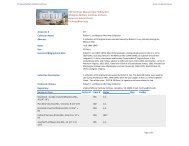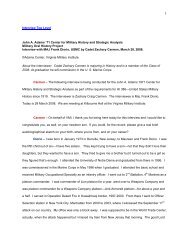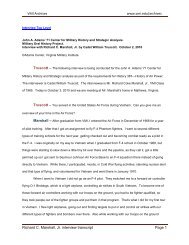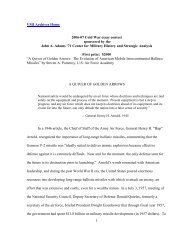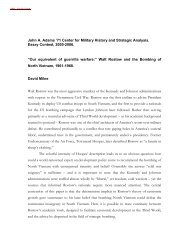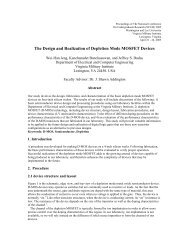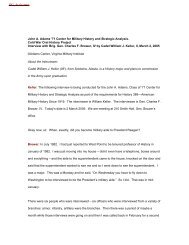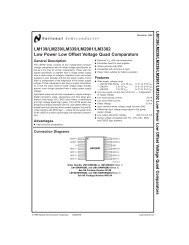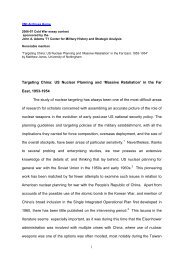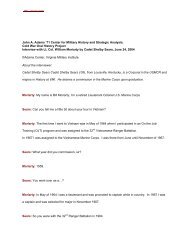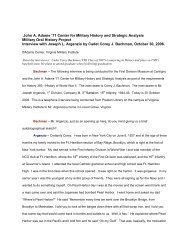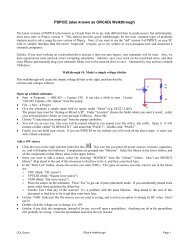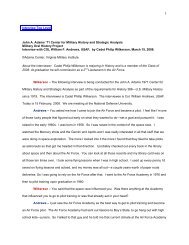Academic Catalog - Virginia Military Institute Admissions
Academic Catalog - Virginia Military Institute Admissions
Academic Catalog - Virginia Military Institute Admissions
You also want an ePaper? Increase the reach of your titles
YUMPU automatically turns print PDFs into web optimized ePapers that Google loves.
<strong>Virginia</strong> <strong>Military</strong> <strong>Institute</strong><br />
12-13 <strong>Catalog</strong>ue<br />
FR 304. FRENCH COMPOSITION AND CONVERSATION 3—0—3<br />
Designed for students who wish to gain a command of spoken and written French.<br />
Conducted in French. Prerequisite: FR 202.<br />
FR 305W and FR 306W. FRENCH THOUGHT ACROSS THE CENTURIES 3—0—3<br />
3—0—3<br />
Survey of French contributions to philosophy, history, science, political theory and belleslettres<br />
from the Middle Ages, to the Existential writers of the XXth Century. All genres, poetry,<br />
narrative, exposition, drama as well as the evolution of the language itself. A Writing-Intensive<br />
Course requiring regular submission of written compositions and the regular re-writing and<br />
editing of such material. Prerequisite: French 202.<br />
FR 314. French Civilizations and Cultures 3—0—3<br />
Overview of history, art, politics, geography, educational and legal systems, reigning<br />
philosophy of the former colonies of Indochina, Africa, the Caribbean (the DOM-TOM)<br />
and Québec. Texts include newspapers, popular media, personal and official documents,<br />
literary expression, and film. Spoken and written French exercised. Prerequisite: French 202.<br />
FR 315. Introduction to Francophonic Texts 3—0—3<br />
Builds on reading skills acquired in FR 201 and FR 202 by presenting a variety of texts<br />
from many fields of interest: politics, business, literature, history. The language of instruction<br />
is French. Emphasis on developing good reading and writing skills. Prerequisite: FR 202.<br />
FR 330. FRENCH MASTERPIECES IN TRANSLATION I 3—0—3<br />
Survey of French contributions to philosophy, history, science, political theory, and<br />
belleslettres from the Middle Ages to the Revolution, designed for students with no knowledge of<br />
French language. Includes origin and development of the genres: poetry, narrative, exposition,<br />
drama. Regular submission of compositions and re-writing and editing of such material.<br />
This course follows the outline of French 305W though availability of readable translations<br />
dictates the choice of texts. This course does not include a foreign language component<br />
and cannot be used toward a language requirement. Prerequisite: WR 102 with a minimum<br />
grade of C. Cadets may not earn credit for both FR 330 and FR 305W.<br />
FR 331. FRENCH MASTERPIECES IN TRANSLATION II 3—0—3<br />
Survey of French contributions to philosophy, history, science, political theory, and belles<br />
lettres from Romanticism to the present, designed for students with no knowledge of the<br />
French language. Continued development of the genres: poetry, narrative, exposition, drama.<br />
Regular submission of compositions and the regular re-writing and editing of such material.<br />
This course follows the outline of French 306W though availability of readable translations<br />
dictates the choice to texts. This course does not include a foreign language component<br />
and cannot be used toward a language requirement. Prerequisite: WR 102 with a minimum<br />
grade of C. Cadets may not earn credit for both FR 331 and FR 306W.<br />
FR 405 and FR 406. INDEPENDENT READING 3—0—3<br />
Directed readings of major literary works, written reports and a research paper required.<br />
Taught in French. At least one research paper is required. Prerequisite: permission of the<br />
Department Head. Retakes for credit.<br />
FR 409. STYLISTICS IN FRENCH 3—0—3<br />
Recapitulation of grammar with emphasis on expansion of vocabulary, development of<br />
style in speaking and writing. Materials used will be film, journalism, exposition, interviews,<br />
broadcast media, and other sources. Prerequisite: Two 300-level French courses.<br />
FR 410. NARRATIVE AND EXPOSITION IN FRENCH 3—0—3<br />
A study of narration in French, from Medieval epics and early French story-telling through<br />
Montaigne and Flaubert, Shendhal, Robbe-Grillet, Perec. Political theory and philosophical<br />
and scientific writings as well as tracts by moralists like Pascal or Descartes supplement<br />
purely fictional accounts. Extensive reading and analytical writing about these documents.<br />
Prerequisite: Two 300-level French courses.<br />
FR 411. DRAMA AND FILM IN FRENCH 3—0—3<br />
A study of dramatic modes in French, from Medieval through the Neo-Classical to the<br />
modern théatre de l’absurde and into the XXth Century. Extensive use of film versions of plays<br />
under study. Extensive reading and analytical writing about these documents. Prerequisite:<br />
Two 300-level French courses.<br />
FR 412. FRENCH POETRY AND POPULAR MUSIC 3—0—3<br />
A study of French verse, from the Middle Ages through the Renaissance and XVIIth<br />
Century to modern manifestations of poetry: vers libres, symbolisme, l’art pour l’art. Brel,<br />
Piaf, Gainsbourg, Vian. Prerequisite: Two 300-level French courses.<br />
FR 413. FRANCOPHONE OR NON-CONTINENTAL FRENCH 3—0—3<br />
A study of expression in French, including works from (the Maghreb), Black Africa, Indochina,<br />
Canada and Louisiana, and the Caribbean Basin. Prerequisite: Two French courses at 300-level.<br />
FR 414. THEMES, FIGURES, PERIODS, REGIONS 3—0—3<br />
Detailed study of French culture, society, or history (colonialism, revolution, race, protoscience,<br />
economic and political theory), a given author through study of all his or her works<br />
(Beauvoir, Duras, Gide St-Expupéry, Joan of Arc, Napolean), a period of innovation in theory<br />
of creation (Symbolism, Existentialism, Renaissance, Exploration), or an area of particular<br />
interest (French Caribbean). Prerequisite: Two 300-level French courses.<br />
FR 450. MODERN LANGUAGE CAPSTONE COURSE 3—0—3<br />
The student will choose a topic incorporating an analysis of historical, literary or cultural<br />
factors in the major language area - field experience and interdisciplinary topics are strongly<br />
encouraged. Upon approval of the faculty adviser, the student will prepare both a research<br />
paper and a 20-minute oral presentation. This course is open to first and second class Modern<br />
Language majors or minors. The ML Capstone project will be written in the student’s major<br />
foreign language, as appropriate, and it will achieve a language rating of “Advanced-High”.<br />
All relevant documentation will adhere to MLA specifications. An accepted ML Honors Thesis<br />
could substitute for this course.<br />
FR 470. special topics in french 3—0—3<br />
An advanced topics course that will vary to reflect cadet and professorial interests. This<br />
course fosters a close reading of text and discussion of diverse topics from the French<br />
world to reinforce advanced language and cultural knowledge. Prerequisite: Two 300-level<br />
French courses or their equivalent.<br />
GEOLOGY<br />
DEPARTMENT OF CIVIL AND ENVIRONMENTAL ENGINEERING<br />
DEPARTMENT head: CAPTAIN RIESTER<br />
Requirements for a major in civil engineering are specified on pages 44-47.<br />
GE 306. ENGINEERING GEOLOGY 3—3—4<br />
Earth material properties and geological processes as they apply to the solution of<br />
engineering problems. Case histories, rich visual imagery, a field trip, and three hours of lab<br />
per week assist in fully developing this "Natural Science Elective." Prerequisite: Enrollment<br />
in civil engineering or permission of instructor.<br />
GERMAN<br />
DEPARTMENT OF MODERN LANGUAGES AND CULTURES<br />
department head: Colonel Bulger-Barnett<br />
1. All cadets who enter with two or more entrance units in a modern foreign language<br />
are given placement tests and are placed in appropriate courses on the basis of the test<br />
results, their previous high school language coursework, and after consultation with the<br />
department head of modern languages.<br />
2. A single year of a foreign language shall count toward meeting graduation requirements<br />
only when the cadet is studying a second language or is taking a language as an elective.<br />
3. Classroom work is supplemented with computer-aided language instruction in a wellequipped<br />
Language Learning Center.<br />
Prerequisites: Cadets must demonstrate proficiency in ML 101 in order to be admitted into<br />
ML 102. They must, similarly, demonstrate proficiency in ML 102 before enrolling in ML 201,<br />
and in ML 201 before enrolling in ML 202/204. Proficiency in ML 202/204 is a prerequisite for<br />
admission to 300-level courses. Completion of two 300-level courses or their equivalent is<br />
expected before enrollment in any 400 -level course. Once a cadet has completed work at<br />
the 202/204 level, he/she may not return to the elementary level course for credit.<br />
Cadets who present three or more years of a high school language or demonstrate native<br />
or near-native language abilities may not enroll at the elementary level of that language. Such<br />
students will have the choice of enrolling either in the first semester intermediate level of that<br />
language or in the first semester elementary course of a different language.<br />
GR 101. ELEMENTARY GERMAN 3—0—3<br />
An introduction to the fundamentals of German. Primary emphasis on the acquisition<br />
of the basic language skills (comprehension, speaking, reading, and writing). Secondary<br />
emphasis on the cultures where German is spoken. Intended for beginners with no previous<br />
experience in the language.<br />
GR 102. ELEMENTARY GERMAN 3—0—3<br />
A continuation of GR 101. Prerequisite: GR 101.<br />
GR 201. INTERMEDIATE GERMAN 3—0—3<br />
Reviews principles of grammar and expands the student’s conversational skills. This<br />
course is intended to consolidate the basic language skills and to prepare the student for<br />
advanced work in German. Readings based on civilization and culture. Prerequisite GR 102.<br />
GR 202. INTERMEDIATE GERMAN 3—0—3<br />
A continuation of GR 201. Prerequisite: GR 201.<br />
GR 303W. INTRODUCTION TO CONTEMPORARY GERMAN CULTURE 3—0—3<br />
A study of contemporary German issues including cultural events, travel, economy, politics,<br />
education, transportation, and public opinion. Prerequisite: GR 202. Writing Intensive (W).<br />
GR 304W. INTRODUCTION TO CONTEMPORARY GERMAN CULTURE II 3—0—3<br />
A study of contemporary German issues focusing on economy and German for business.<br />
Prerequisite: GR 202. Writing Intensive (W).<br />
92




